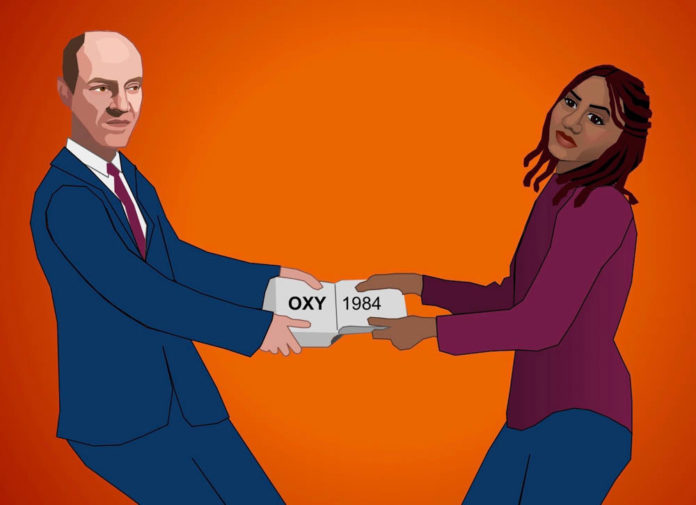My junior year of high school, I played on an all-white varsity soccer team at a local inner-city school. Midway through our season, a girl on our team was caught posting racist images of herself and using the n-word. In response to her behavior, we had one haphazard conversation about race in which my teammates and coach decided we should “move forward.” I was deeply unsettled. In the spirit of “moving forward,” she suddenly became the victim, not the perpetrator. She could come to team dinners, the coach decided; she could still play in games. I felt there were still unresolved issues of race and privilege, and I wasn’t ready to move forward. But when I spoke up about it, my teammates and coach told me I was holding the team back.
Institutions and leaders often use the rhetoric of “moving forward” before communities have time to grieve and process. It’s a tactic to avoid necessary and difficult conversations. Moving forward should mean that we, as a community, have thoroughly discussed the issue and its implications; it should mean Oxy takes the time to look back on its history.
Like many of my peers, I am appalled by the yearbook scandal at Occidental College. The yearbook pictures in question included a board of trustees member wearing blackface and her husband featured in another yearbook picture captioned “The Aryan Alliance.” Another recent article explained that Occidental gave an honorary degree to Paul Popenoe, an American eugenist who advocated for race cleansing. These two events show that we as an institution fail to remain accountable for our problems both now and in the past. I’m incredibly frustrated, but not surprised. These racist incidents are not isolated, they are simply icing on the cake — a collapsing cake baked with white flour and missing ingredients.
These incidents, shocking and upsetting as they are, are a microcosmic view into greater equity issues at Occidental. They demonstrate the lack of social and emotional support for the issues that black students face and the inadequate transparency on behalf of Occidental’s administration. The sad but unfortunate truth is that Occidental is not an outlier. Higher education was historically built on racial hierarchies, and today, institutions across the country still fail to be diverse and inclusive of minorities. This statement doesn’t excuse Occidental, but it shows that racism is alive and well, especially on college campuses.
I attended the ASOC listening session on blackface, anti-Semitism and eugenics March 22 addressing these incidents and Oxy’s institutional history in the context of the college. I felt empowered by the students who had the courage to speak out. I was disappointed, however, by the responses to these incidents on behalf of both the trustees and the school administration. It is clear that we are trying to inauthentically “move forward.” Their responses indicated that we are more concerned with our image than with addressing those wronged and the greater impact of racism on this campus. I recognize that the trustees and administration were trying to amend their mistakes, but they failed to see how deeply painful these incidents were for the affected students. I wanted a heartfelt response — one that addressed the problematic history at the college. I wanted to know that students’ concerns were heard and that their frustration wasn’t antithetical to moving forward, but instead, immensely valid.
According to a report in Education Dive, “Colleges that fail to adequately address student concerns following racist incidents on campus can suffer from immediate and long enduring ramifications.” To be clear, I am not against moving forward. I believe, however, that our choice to move away from these instances must be authentic and must consider the feelings of the parties involved. This choice to move forward must be initiated on behalf of the students affected by the racist acts. It is tempting to run from these issues after the negative publicity loses its heat, instead of digging our heels in.
Oxy’s administration and trustees need to reach out to its black community and preserve the Black Studies and American studies programs. Professor Baker, the Chair of the Black Studies department, released an open letter announcing her resignation, which reaffirms the importance of addressing Oxy’s problematic history. We need to provide our students here with a comprehensive history that includes the AGC Occupation, issues of blackface and anti-Semitism in La Encina and an honest account of racial disparity at Occidental and higher education nationwide. Without this, students will fail to understand Occidental’s racial inequities and won’t work to change them.
It has been two years since the racist scandal occurred on my high school soccer team, and I now am experiencing eerie déjà vu. I am confronted with a new institution, one equipped with money and resources but reluctant to address these issues. I recognize the pressure to uphold a reputable image of the college. However, calling out and amending issues of racism does not detract from Oxy’s values. Students here need to know about Oxy’s past, so they can work actively to change the campus culture, which is deeply embedded in historical injustices. It is possible to love your school and be critical of it — because I know Occidental can do better.
Maddie Solomon is an undeclared first year. She can be reached at solomonm@oxy.edu.
![]()































